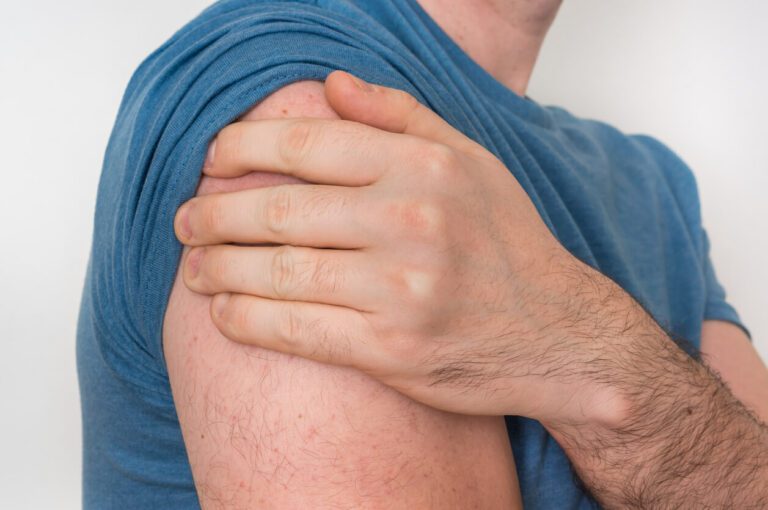
Shoulder pain can interfere with everyday activities and keep you from doing the things you love. Whether you are an athlete or not, shoulder injuries often occur unexpectedly, and understanding the cause of your pain is essential. One common culprit behind persistent or acute shoulder pain is a torn rotator cuff.
This blog will help you identify the signs of a torn rotator cuff, understand the causes, and know when to seek expert care.
What is a Torn Rotator Cuff?
The rotator cuff is a group of four muscles and tendons that help stabilize your shoulder joint. It allows you to lift and rotate your arm. Damage to this area, whether through injury or wear, is known as a torn rotator cuff. This injury can be partial, where there is damage to the tendon but it is not completely severed, or full-thickness, where the tendon is entirely detached from the bone.
What Causes a Torn Rotator Cuff?
The causes of a torn rotator cuff often fall into two categories— acute injuries and degenerative wear and tear.
Acute Injuries
Acute injuries often occur suddenly due to trauma. These injuries are commonly seen in athletes or individuals engaging in activities that demand repetitive shoulder movements. Common causes include:
- Falling on your outstretched arm
- Lifting something that is too heavy
- Overuse in sports like tennis, baseball, or swimming
Degenerative Wear and Tear
Degenerative tears often occur gradually and are generally linked to aging and repetitive strain. Causes often include:
- Everyday overhead activities, such as reaching for objects on high shelves
- Weakening of tendons over time, especially in individuals over the age of 40
- Poor posture, such as slouching, which can place strain on shoulder tendons
Signs and Symptoms of a Torn Rotator Cuff
Recognizing the signs of a torn rotator cuff early can help you avoid further damage. Below are the most common symptoms to look out for.
Pain
Pain is one of the main indicators of a torn rotator cuff. This pain can present itself in multiple ways:
- Pain that worsens during arm movements, especially overhead activities
- Discomfort at night, which may prevent you from sleeping on the affected shoulder
- Pain that travels from the shoulder down to the elbow
Weakness
A torn rotator cuff often results in shoulder weakness. You might notice difficulties performing everyday activities such as brushing your hair, lifting groceries, or reaching up to grab something.
Limited Range of Motion
Stiffness and reduced mobility are common when dealing with a torn rotator cuff. You may find yourself avoiding certain movements because of limited range of motion or discomfort.
Clicking or Popping Sounds
If you hear clicking or popping sounds when you move your arm, it may be a sign of tendon damage or weakness within the rotator cuff.
Swelling and Tenderness
The shoulder can become unusually tender or swollen when affected by a torn rotator cuff. This is especially common immediately following an injury.
Why Seek Treatment from Paul Meli Orthopedics?
If your symptoms persist or worsen, seeking professional care is crucial. Paul Meli Orthopedics offers advanced treatment options to help you regain mobility without prolonged discomfort.
About Dr. Paul Meli
Dr. Paul Meli is a fellowship-trained and board-certified orthopedic surgeon specializing in shoulder injuries, including torn rotator cuffs. With years of experience in both surgical and nonsurgical treatments, Dr. Meli focuses on personalized care tailored to patients’ specific needs. His mission is to get you back to your routine with minimal downtime.
Treatment Options
At Paul Meli Orthopedics, the focus is on offering individualized and effective treatment plans. Options include:
- Nonsurgical Treatments
Many patients experience improvement with physical therapy, anti-inflammatory medications, and activity modifications. Advanced imaging technologies help determine the extent of your injury for a targeted recovery strategy.
- Minimally-Invasive Surgery
Dr. Meli specializes in arthroscopic surgery, a minimally-invasive option that allows for quicker recovery while reducing pain and scarring. This procedure is often recommended for severe or full-thickness tears.
A Commitment to Your Recovery
Dr. Meli and his team believe that patient education is essential for effective recovery. They will guide you every step of the way, from understanding your diagnosis to post-treatment rehabilitation.
Torn Rotator Cuff Treatment in Fort Lauderdale, Florida
Do not ignore persistent shoulder pain or loss of function. Early diagnosis and intervention can make all the difference in your recovery.
To schedule a consultation with Dr. Paul Meli, contact Paul Meli Orthopedics at (954) 324-7711 or fill out and submit our convenient Request an Appointment form, and we will contact you promptly.
Regain your strength and mobility with care you can trust.
Citation:
Torn rotator cuff: Rotator Cuff Tear: Symptoms & Treatment

